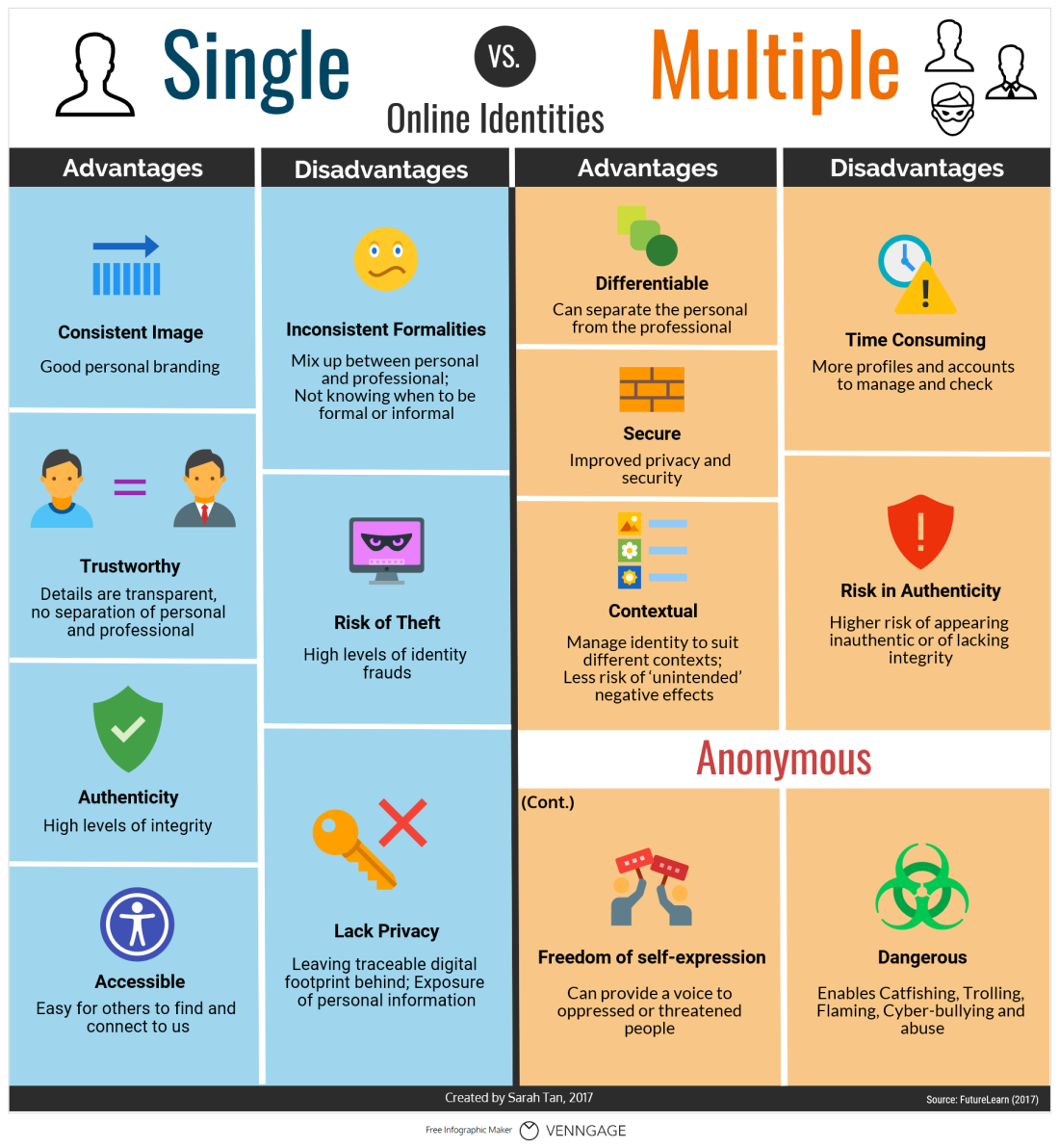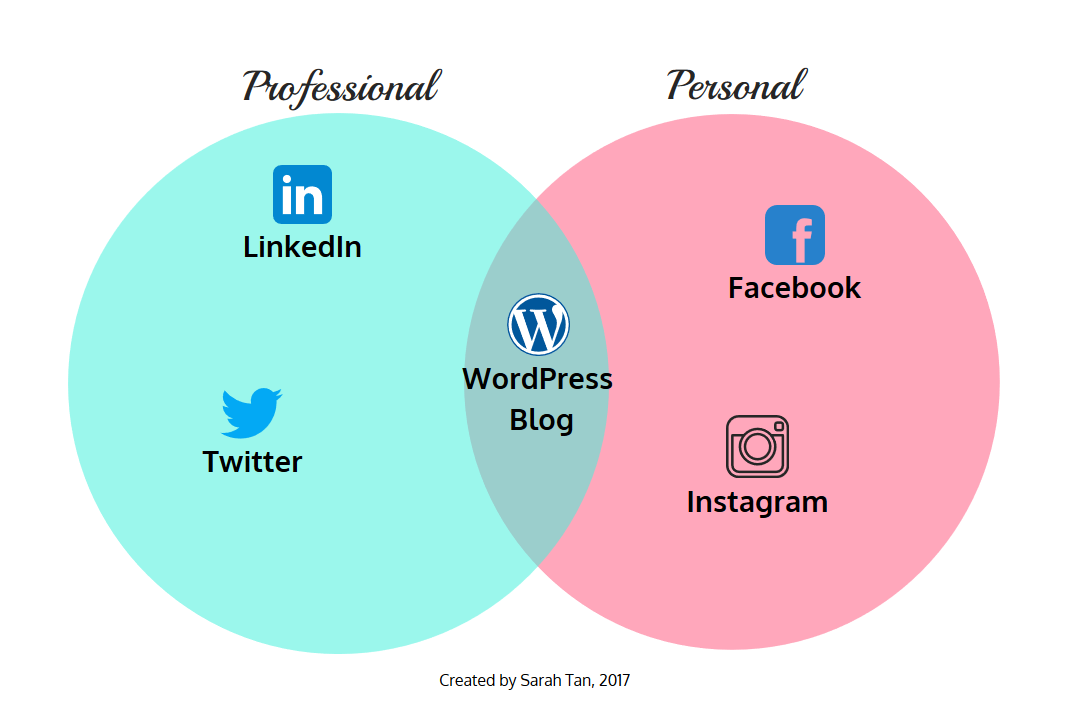Social media has grown at such a rapid pace that some people are still wondering how it fits into their lives on a personal and/or professional level. (QUOC, 2017). Everyone has their own way of using social media according to specific needs such as connecting with friends, personal interests or work purposes. It is a platform where we express ourselves, through our preferences and personality.
Who you are online is just as important as who you are offline. What do you want the world to know about you? How do you want to portray yourself? It all boils down to how you manage your digital identity.
(Original Content. Self-Produced via PowToon, 2017)
Our online activity is available to anyone with internet access. Hence, we need to be careful with what we display on our online profiles. So, how many digital “selves” should we have? The biggest difference between personal and professional networking is purpose and mindset. (Engel, 2012). Ultimately, it is an individual preference whether to have a single online identity or multiple online identities. Here is an overview of the pros and cons for each.

(Adapted from FutureLearn. Self-Produced via Venngage, 2017)
I shared my initial approach on the FutureLearn MOOC discussion.


(UOS, FutureLearn, 2017)
After thinking it through, I found it more ideal to have multiple online identities for different purposes and audiences. Managing virtual life and profile is indeed critical in one’s employability. Social recruiting has become a rising trend – 70% of employers use social media to screen candidates before hiring. (Salm, 2017).
By making a clear distinction of my online identities, I am able to showcase my profile, experiences and achievements professionally while still holding on to my personal life with people I can trust. This is what I plan to adopt.

(Original Content. Self-Produced, 2017)
In short, we have to be conscious about how we manage our digital identity. Who we are on social media is a critical determinant of our personal branding and image.
Word Count: 300
References
Bennett, S., (2012). Adweek. People Use Different Social Networks for Different Reasons, Says LinkedIn.
Engel, A., (2012). LinkedIn. LinkedIn Research Reveals Insight into the Mindset of Today’s Professional.
George, J., (2016). LinkedIn. Maintaining Personal vs. Professional Identity on Social Media.
Krotoski, A., (2012). theguardian. Online Identity: is authenticity or anonymity more important?
Queens University of Charlotte, (2017). Managing Personal vs. Professional Identity on Social Media.
Salm, L., (2017). CareerBuilder. 70% of employers are snooping candidates’ social media profiles.
TheEmployable, (2014). How blogging can help you get a job.
University of Southampton, (2017). Future Learn. Learning in the Network Age – Network Identity.
Hi Sarah,
I love this quote from your blog – “Who you are online is just as important as who you are offline.” Before #MANG2049, I was also using the single identity approach where my personal and professional networking is mix together. But after this, I agree with you that it is ideal for us to have multiple identities. We will be able to use different identities for a different context. This will be especially useful for us as we are going to work in the society soon. A study from CareerBuilder revealed that 70% of employers now use social media to screen job candidates before hiring them. (https://www.businessnewsdaily.com/2377-social-media-hiring.html) Personally, I would still use the single approach for now. As the degree of effort plays an important factor and having multiple identities is time-consuming. But I will integrate my use of single identity by “Cleaning Up” my social media accounts such as deleting inappropriate post or photos and improving my privacy and security by changing the settings. What are your thoughts?
LikeLike
Hi Julian! Thanks for your question!
I think the process of “Cleaning Up” my social media account is something I strongly relate to. I do so on a regular basis to ensure that no matter who views it, whether it’s my friend or my future employer, they will have a good impression of how I present myself. Managing and maintaining a good impression in social media is important. To begin with, I exercise caution with the contents I post online. Secondly, I believe in honesty and integrity with what I share online. This includes no fabrication or distortion of facts and news. With these principles, the cleaning up should be a breeze.
Generally, I make my social media posts private which allows me to control who is able to view what I post. This ensures that only trusted people can have a glimpse into my personal life. However, I feel the growing importance of having multiple identities as we evolve and eventually get into the working world.
I’m glad that there are social media sites like LinkedIn which demand a more professional presentation. Connecting with people professionally requires us to project a certain image of the profession we are in. It’s not only about building our image but through these links, we are also expanding our professional network which may come in useful in our work life. Also, as more employers use social media to screen job candidates, a professional social media profile on LinkedIn will help satisfy this need.
LikeLiked by 1 person
Hey Sarah!
Love the way you presented what you’ve learned from FutureLearn! The infographic was quite clear and the icons helped to convey the meaning at a glance!
You’ve mentioned how you had adopted the single identity approach initially, but decide to change after a discussion on FutureLearn. I too had a change in approach over the years, albeit, with different context and setting, but I am definitely able to relate to you.
I noticed how you’ve decided to adopt certain social media platforms for different purposes. Would there be a clear line drawn between them? For example, the people you know through LinkedIn and Twitter, your professional networks such as employers and colleagues, would some of them become part of your personal network on Instagram and Facebook? Similarly, would your personal network become part of your professional networks?
Let me know what you think!
Cheers,
Victoria
LikeLike
Hi Victoria, that is a very interesting point you raised!
I have never actually thought about this matter before. To answer your question, currently, I do in fact draw a clear distinction between my personal contacts and professional network. I am a very private person by nature and do not feel the need or desire to be too open about my personal and social life with too many people. As such, I tend to allow only close friends or people I trust into my personal space.
Generally, I would draw a very clear line between professional and personal networks. For example, my contacts on LinkedIn are usually part of my professional network, and unless they are friends with me in real life, they will not have access to my social media postings. However, I feel that to some extent, my personal network can tie in with my professional network as some of the colleagues I’ve met have become close to the point of being personal friends, so they eventually have access to both networks.
LikeLiked by 1 person
Hi Sarah,
I enjoyed reading the infographics of both identities. The post was well-structured and clear. Based on your engagement with MOOC, you mentioned that you prefer single identity to multiple identities. Do you find any challenges of maintaining single identity?
Based on my experience of having multiple identities, I find its time-consuming as I have to manage and check my account before penning down my thoughts. I agree with you that having multiple identities is ideal especially for work purposes. Research of Journal of Organisational Behaviour has found that “When individuals have multiple identities involving dependencies, a deep structure identity and value-based commitment to one collective can contribute to the development of a situated identity and exchange-based commitment to another.” http://onlinelibrary.wiley.com/doi/10.1002/job.383/pdf (Pg 12). This indicates that the employees of multiple identities will have a sense of belonging and value-added commitment towards work. What do you think?
Cheers,
Xin Yi
Word Count: 150
LikeLike
Hi Xin Yi! Thanks for sharing the interesting article!
Yes, I did mention that I preferred having a single identity. The common challenge I faced was that there were a lot of random people adding me on social media, most of which I declined. There was not much privacy even though my account was set up as private. I didn’t feel like I can share my identity in a professional aspect as most of my posts are rather informal and may not be appropriate for prospective employers or professionals to view. The consequence of such postings may hinder my employability.
After some thought, I felt that having multiple identities is in fact more ideal. I believe that in our personal interactions, we have different circles of friends. Those that we spend time socially, and those who are casual acquaintances or colleagues. Likewise, in social media, having multiple identities allow us to separate the personal from the professional. By having a separate identity for the workplace, I am able to showcase myself professionally and display my most suitable qualities expected in the workplace. Ultimately, having a sense of development, belonging and commitment towards work.
LikeLiked by 1 person